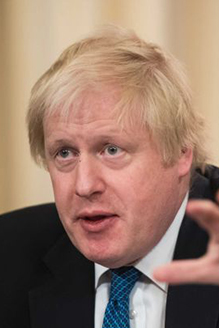LONDON, (Reuters) – Former Foreign Minister Boris Johnson launched a two-pronged attack on Britain’s government yesterday, criticising suggestions it may increase taxes to fund services and its management of a high-speed rail project.
In his weekly column in the Telegraph newspaper, Johnson, bookmakers’ favourite to succeed Prime Minister Theresa May, called on the government to avoid turning on the “hard-pressed taxpayer” for money to fund public services, and instead embrace Brexit to spur a “dynamic economy”.
Johnson has become a thorn in the side of May since he resigned as foreign minister over her Brexit plan, using newspaper columns to pressure her government over everything from social and fiscal policy to Britain’s departure from the European Union in what some lawmakers see as a leadership bid.
Earlier, he was criticised for accusing May of wrapping “a suicide vest around” Britain and handing the detonator to the EU with her plans for Brexit – the biggest shift in British foreign and trade policy for almost half a century.
“We do need to spend more on the NHS (National Health Service). We must find the extra 20 billion pounds ($25.84 billion) that the chancellor (finance minister) has rightly promised. We do need to step up our investments in the police and schools and other vital public services,” he wrote.
“But I am afraid I am not convinced that the answer is immediately to turn to the hard-pressed taxpayer, when Britain is now by no means a low-tax economy compared with several other jurisdictions in Europe.”
Britain should look to the United States, he said, using what he called an unfashionable argument to highlight its high growth rates, record low employment and what he described as a government that “wants to liberate and energise people”.
Earlier this year, May pledged to increase funding for the NHS by 20 billion pounds ($26.57 billion) over the next five years but said some of the funding would need to come from higher taxes or more borrowing.
Johnson also said that “someone should pay a price” for the difficulties with Britain’s multi-billion pound rail project High Speed 2, which has been delayed, seen costs rise and put pressure on Transport Minister Chris Grayling.
The figurehead for Britain’s campaign to leave the EU, Johnson again urged the government to be confident over Brexit, saying the “direful predictions” for the economy before the 2016 referendum had not turned out to be true.
“Now is the time for this Conservative government to show how a post-Brexit Britain will be a happy and dynamic economy that fosters enterprise, that rewards the strivers and the innovators, and where people can hope to take home more of their pay to their families,” he wrote

